|
|
|
Sort Order |
|
|
|
Items / Page
|
|
|
|
|
|
|
| Srl | Item |
| 1 |
ID:
051397
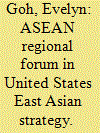

|
|
|
| 2 |
ID:
079253
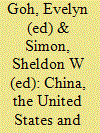

|
|
|
|
|
| Publication |
London, Routledge, 2008.
|
| Description |
vii, 206p.
|
| Standard Number |
9780415429450
|
|
|
|
|
|
|
|
|
|
|
|
Copies: C:1/I:0,R:0,Q:0
Circulation
| Accession# | Call# | Current Location | Status | Policy | Location |
| 052728 | 327.51/GOH 052728 | Main | On Shelf | General | |
|
|
|
|
| 3 |
ID:
168928
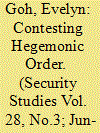

|
|
|
|
|
| Summary/Abstract |
This paper develops an English School–informed approach to theorize hegemonic order using an explicitly social lens. It conceptualizes the architecture of hegemonic order as consisting of three social elements—compact, structure, and processes—and emphasizes social exchange, power relationships, and negotiation as the bridges linking hegemony and order. Using the most significant contemporary case of hegemonic contestation, it employs this hegemonic order framework to analyze how, and with what effects on systemic change, China is contesting the US-led hegemonic order in East Asia. It finds that variation in the forms and effects of Chinese contestation in the security, institutional, and economic domains is explained by differences in the robustness of the US hegemonic social compact, and the complexity of the regional social structure.
|
|
|
|
|
|
|
|
|
|
|
|
|
|
|
|
| 4 |
ID:
080675
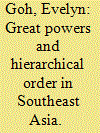

|
|
|
|
|
| Publication |
2007.
|
| Summary/Abstract |
The small and medium-sized states in Southeast Asia have faced significant geostrategic changes with the end of the Cold War and the rise of China. Over the last decade, scholars have debated how these countries would cope with growing Chinese power, and how their relations with the other major powers in the region would change. Some analysts have suggested that the region is shifting toward a more China-centered order, but this view is premature. Eschewing the simple dichotomy of balancing versus bandwagoning, Southeast Asian countries do not want to choose between the two major powers, the United States and China. This avoidance strategy is not merely tactical or time-buying; instead, Southeast Asian states have actively tried to influence the shape of the new regional order. Key Southeast Asian states are pursuing two main pathways to order in the region: the "omni-enmeshment" of major powers and complex balance of influence. They have helped to produce an interim power distribution outcome, which is a hierarchical regional order that retains the United States' dominant superpower position while incorporating China in a regional great power position just below that of the United States.
|
|
|
|
|
|
|
|
|
|
|
|
|
|
|
|
| 5 |
ID:
071285
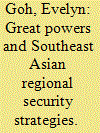

|
|
|
| 6 |
ID:
049312
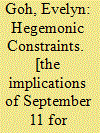

|
|
|
|
|
| Publication |
Singapore, Institute of Defence and Strategic Studies, 2002.
|
| Description |
ii, 23p.
|
| Series |
Working paper series; no. 34
|
|
|
|
|
|
|
|
|
|
|
|
Copies: C:1/I:0,R:0,Q:0
Circulation
| Accession# | Call# | Current Location | Status | Policy | Location |
| 046017 | 303.6250973/GOH 046017 | Main | On Shelf | General | |
|
|
|
|
| 7 |
ID:
083221
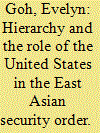

|
|
|
|
|
| Publication |
2008.
|
| Summary/Abstract |
To construct a coherent account of East Asia's evolving security order, this article treats the United States not as an extra-regional actor, but as the central force in constituting regional stability and order. It proposes that there is a layered regional hierarchy in East Asia, led by the United States, with China, Japan, and India constituting layers underneath its dominance. The major patterns of equilibrium and turbulence in the region since 1945 can be explained by the relative stability of the US position at the top of the regional hierarchy, with periods of greatest insecurity being correlated with greatest uncertainty over the American commitment to managing regional order. Furthermore, relationships of hierarchical assurance and hierarchical deference help to explain critical puzzles about the regional order in the post-Cold War era.
|
|
|
|
|
|
|
|
|
|
|
|
|
|
|
|
| 8 |
ID:
105717
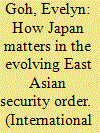

|
|
|
|
|
| Publication |
2011.
|
| Summary/Abstract |
This article argues that Japan matters crucially in the evolving East Asian security order because it is embedded both in the structural transition and the ongoing regional strategies to manage it. The post-Cold War East Asian order transition centres on the disintegration of the post-Second World War Great Power bargain that saw Japan subjecting itself to extraordinary strategic constraint under the US alliance, leaving the conundrum of how to negotiate a new bargain that would keep the peace between Japan and China. To manage the uncertainties of this transition, East Asian states have adopted a three-pronged strategy of: maintaining US military preponderance; socializing China as a responsible regional great power; and cultivating regionalism as the basis for a long-term East Asian security community. Japan provides essential public goods for each of these three elements: it keeps the US anchored in East Asia with its security treaty; it is the one major regional power that can and has helped to constrain the potential excesses of growing Chinese power while at the same time crucially engaging with and helping to socialize China; and its economic and political participation is critical for meaningful regionalism and regional integration. It does not need to be a fully fledged, 'normal' Great Power in order to carry out these roles. As the region tries to mediate the growing security dilemma among the three great powers, Japan's importance to regional security will only grow.
|
|
|
|
|
|
|
|
|
|
|
|
|
|
|
|
| 9 |
ID:
049713
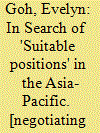

|
|
|
|
|
| Publication |
Singapore, Institute Of Defence and Strategic Studies, 2003.
|
| Description |
15p.
|
| Series |
IDSS Working Paper No. 51
|
|
|
|
|
|
|
|
|
|
|
|
Copies: C:1/I:0,R:0,Q:0
Circulation
| Accession# | Call# | Current Location | Status | Policy | Location |
| 047343 | 327.73051/GOH 047343 | Main | On Shelf | General | |
|
|
|
|
| 10 |
ID:
106461
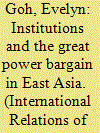

|
|
|
|
|
| Publication |
2011.
|
| Summary/Abstract |
This article argues that in the post-Cold War strategic transition in East Asia, ASEAN has helped to create a minimalist normative bargain among the great powers in the region. The regional norms propagated through the 'ASEAN way', emphasizing sovereignty, non-intervention, consensus, inclusion, and informality were extremely important in the initial stages of bringing the great powers - especially China and the United States - to the table in the immediate post-Cold War period. During this time, ASEAN helped to institutionalize power relations legitimizing the role of the great powers as well as the 'voice' of smaller states in regional security management. But the process of institutionalizing great power relations contains further steps, and what ASEAN has achieved is well short of the kind of sustained cooperation on the part of the great powers that is so necessary to the creation of a new stable regional society of states. Moreover, ASEAN has provided the great powers with a minimalist normative position from which to resist the more difficult processes of negotiating common understanding on key strategic norms. At the same time, ASEAN's model of 'comfortable' regionalism allows the great powers to treat regional institutions as instruments of so-called 'soft' balancing, more than as sites for negotiating and institutionalizing regional 'rules of the game' that would contribute to a sustainable modus vivendi among the great powers. As such, ASEAN's role is limited in, and limiting of, the great power bargain that must underpin the negotiation of the new regional order. This is a task that the regional great powers (the United States, China, and Japan) must themselves undertake.
|
|
|
|
|
|
|
|
|
|
|
|
|
|
|
|
| 11 |
ID:
168399
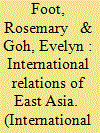

|
|
|
|
|
| Summary/Abstract |
East Asia is a region of signal importance for global order because of its economic dynamism and growing heft, China's challenge to the United States as incumbent regional and global hegemon, and other conflict hotspots like the Korean peninsula. This requires academic analysis that both appreciates the subtleties inherent to this region and can relate them to the wider systemic context. Many analysts have begun to allude to the challenging characteristics that are present in the international relations of East Asia, in particular struggling to explain how growing levels of economic interdependence can coexist with heightened security tensions. This article offers a research prospectus that suggests ways of analyzing these apparently contradictory trends. It proposes the development of research questions and approaches that are more suited to studying the international relations of a region with characteristics that we define as dual, hybrid, and contingent. We propose a Conjunctions Analytical Framework that explores what happens at the conjunctions of the regional-global and the unit-regional/global levels of analysis—the “grey areas” where social formations meet and interact. We aim to help shape the future study of the IR of East Asia and to suggest more effective ways of analyzing the complex reality of East Asia's regional and global politics.
|
|
|
|
|
|
|
|
|
|
|
|
|
|
|
|
| 12 |
ID:
134697
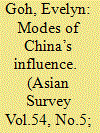

|
|
|
|
|
| Summary/Abstract |
Distinguishing between power as resources and influence as converting those resources into outcomes, I propose a new framework for analyzing China’s influence, using examples from Southeast Asia. Because China exercises influence predominantly in contexts of convergent, not divergent, preferences, three key modes of influence are “preference multiplying,” “persuasion,” and “ability to prevail.”
|
|
|
|
|
|
|
|
|
|
|
|
|
|
|
|
| 13 |
ID:
171455
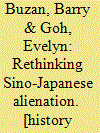

|
|
|
|
|
| Publication |
Oxford, Oxford University Press, 2020.
|
| Description |
xvi, 339p.pbk
|
| Standard Number |
9780198851394
|
|
|
|
|
|
|
|
|
|
|
|
Copies: C:1/I:0,R:0,Q:0
Circulation
| Accession# | Call# | Current Location | Status | Policy | Location |
| 059866 | 327.51052/BUZ 059866 | Main | On Shelf | General | |
|
|
|
|
| 14 |
ID:
167671
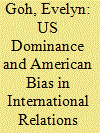

|
|
|
|
|
| Summary/Abstract |
This article responds to the Journal of Global Security Studies special issue on “American Perspectives and Blind Spots on World Politics,” edited by Jeff Colgan. It applauds their significant achievement in offering positivist demonstrations of the bias generated by American assumptions, coding, and preferences, and quantitative demonstration of the systemic and systematic impact of this bias in skewing key assumptions and theories in mainstream US international relations (IR), by selectivizing attention and compromising accuracy. The article pushes the envelope further by arguing that the call to arms is more urgent and more significant than Colgan et al. express. As US hegemony is diluted, the discipline of IR must increasingly account for other parts of the world. Here, cultural bias generates deeper problems with both ontology and epistemology. The article reviews the wider IR field that shows how IR is at once more global and less easily generalizable, driving the imperative to expand the universe of cases for qualitative research. It warns that the problem of US bias and the wider issue of insularity is accentuated by the growing distance between IR scholarship as expressed in top journal publications and “real-world” puzzles and empirical reality—and by ongoing changes in how governments provide state support and funding for IR research and training.
|
|
|
|
|
|
|
|
|
|
|
|
|
|
|
|
| 15 |
ID:
067042
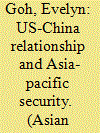

|
|
|
|
|
|
|
|